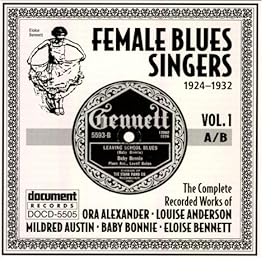We've lost so much in that transition between music's prehistory and early recording. Here's the story of getting back just a teeny bit of it.
The article includes listening links that you do not leave the page to hear, video and photographs. It's one of the Times Magazine's efforts at creating authentic interactive journalism. Beyond the content text, this is one hell of a production.
This is one of the early paragraphs:
Outside any bullyingly hyperbolical attempts to describe the technical beauty of the songs themselves, there’s another facet to them, one that deepens their fascination, namely a certain time-capsule dimension. The year 1930 seems long ago enough now, perhaps, but older songs and singers can be heard to blow through this music, strains in the American songbook that we know were there, from before the Civil War, but can’t hear very well or at all. There’s a song, Geeshie’s “Last Kind Words,” a kind of pre-blues or not-yet-blues, a doomy, minor-key lament that calls up droning banjo songs from long before the cheap-guitar era, with a strange thumping rhythm on the bass string.
Via the embedded music that can be turned on or off at the reader's convenience, what Sullivan's talking about becomes clear.
Reading this essay is rather like sitting with Elijah Wald, sharing the research information of our latest projects with wild enthusiasm -- which has been our pleasure to do again this weekend as he's visiting. BTW, EW's having a terrific spring -- The Dozens: A History of Rap's Mamma, his latest book, has sold out already!
As Dylan shows up in Sullivan's piece so he does in Elijah's work-in-progress, which is about the folk music scene of the 1950's and early 60's.
Here's another intriguing paragraph, about legendary, but not so well known Blues collector, Mack McCormick, about whom EW and I talked yesterday, among other collectors who aren't able to write books of their own out of their laboriously created archives (there are several we know in the latin music world, particularly those who have lived their own lives in Puerto Rican music in New York; they are aging, in poor health -- and poor; so much of what they know will be lost -- yet they don't want to let go of what they know, at least to very many people):
It's sort of like the Story of the Egyptian Captivity and Exodus -- which historically never happened. We choose the stories we want rather than historical fact, because the stories we make up, we make up to nurture, to sustain ourselves. Those stories are more essential to our continuing to live this life, out of which none of us gets alive.
He had said he didn’t want to talk about Robert Johnson, for personal reasons and on principle. But his talk spiraled inexorably toward Johnson anyway. The singer loomed over his memory as he had over his career. What he told me took me aback. McCormick said that what he realized, in the quarter century since Guralnick’s book came out, was that most of what we think we know about Robert Johnson — which is to say, most of what McCormick thought he knew — was highly unstable. We’re not even sure, McCormick said, that the man in the pictures we have, the smiling man with long fingers, holding the guitar, is Robert Johnson. Or that he is, as McCormick put it, “the guy who made the records.” He is a Robert Johnson. But according to McCormick, the more he has lived with the evidence, the more he doubts. Of the people he interviewed so long ago, more than one of those who had met Johnson and been present at one of his two sessions in Texas told McCormick, when they were shown the famous photograph, “That’s not the guy.” It didn’t look like him, they said. Not everyone said that, but a few.According to EW, who, obviously, is well versed in many of the matters of the blues, "It's not as though blues scholars haven't known for ages that much is mythology and not historically factual. This isn't new news (as he shows in his Escaping the Delta), it's that didn't matter much to them."
It's sort of like the Story of the Egyptian Captivity and Exodus -- which historically never happened. We choose the stories we want rather than historical fact, because the stories we make up, we make up to nurture, to sustain ourselves. Those stories are more essential to our continuing to live this life, out of which none of us gets alive.


No comments:
Post a Comment